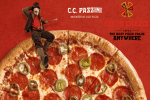Songwriter Ian McDonald, a multi-instrumentalist who helped found King Crimson and Foreigner, died Wednesday. He was 75.
According to a news release, McDonald died “peacefully” at his home in New York City, Rolling Stone reported.
McDonald co-founded Foreigner with Mick Jones and Lou Gramm in 1976 and played various instruments, sang and co-produced the group’s first three albums, the magazine reported. “Foreigner,” in 1977, “Double Vision” in 1978 and “Head Games” in 1979 all cracked the Top 10 in Billboard’s Hot 100 album list. He played on Foreigner tracks like “Hot Blooded,” “Cold as Ice,” “Feels Like the First Time” and “Double Vision,” Variety reported.
Before that, McDonald made his mark as one of the key architects of progressive rock, playing saxophone and keyboards on King Crimson’s 1969 debut album, “In the Court of the Crimson King.”
McDonald also performed as a session saxist on T. Rex’s 1971 album “Electric Warrior,” Rolling Stone reported. He played saxophone on the group’s iconic hit, “Get It On.”
“I’m quite proud of the fact that the two bands I was a founding member of, King Crimson and Foreigner, are still out there playing,” McDonald said in a 2020 interview with Sound & Vision.
Ian McDonald was born in Osterley, Middlesex, in England, on June 25, 1946. He served for five years in the British Army and played in the military jazz band, Rolling Stone reported. He collaborated with Giles, Giles and Fripp, an early project featuring fellow Crimson co-founders Robert Fripp and Michael Giles.
“I was very into things like Stan Kenton and these kind of big bands at the time,” McDonald told Rolling Stone in 2019. “I was still in the Army. I wrote this piece called ‘Three Score and Four,’ and we put it into ‘Schizoid Man’ there. That whole section is mine that I lifted from that score that I had written.”
In later years, McDonald remained proud about his role in King Crimson.
“We were a good band, what can I say?” he told Rolling Stone in 2019. “It was really interesting music, and the live shows were a lot of fun. The improvisations, we just used to go off in really weird places and we’d support each other. … We trusted each other.”

















